Since 2012, the Deferred Action for Childhood Arrivals (DACA) has provided a measure of hope and stability for thousands of children and young adults who are in this country as a result of choices made by their parents. DACA has allowed nearly 800,000 young people the opportunity to work and study without the threat of deportation. They are high school and college students; they are parents of young children, homeowners, teachers, and taxpaying workers. Many of these young people have known no home other than the United States. Without Congressional action soon, the DACA program will end on March 5, 2018 – putting hundreds of thousands of young people at risk of deportation to a country that they do not know; or cause U.S.-born children to lose their parents to deportation.
Fordham University has been steadfast in its support of the DACA Program through our advocacy efforts in Washington, D.C., and will continue to actively and aggressively engage federal policy makers in an effort to either reverse the order or secure a legislative remedy. On Thursday, February 1, Fordham is joining its fellow Jesuit colleges and universities in a nationwide campaign to contact elected officials in support of the DREAM Act (Durbin-Graham). This legislation would allow these young people who grew up in the United States to continue to contribute to the country they love, and offer a pathway to citizenship.
Here’s how you can help on February 1:
- Join your colleagues from around the nation by calling House Speaker Paul Ryan at (202) 225-0600 and Senate Majority Leader Mitch McConnell at (202) 224-3135 and urge the leaders to come together and take immediate action in support of the DREAM Act.
- Take a moment and write your legislators in support of the DREAM Act and urge your friends and families to do likewise. In coordination with Fordham, The Ignatian Solidarity Network (ISN) has developed an electronic message which will self-populate with your elected representative’s information depending upon the constituent address provided.
Since 1841, Fordham University has embodied the immigrant experience. It was built by immigrants, and it provided countless new Americans with the opportunity to earn an education. With your help, we can insist that those opportunities remain in place and affirm the highest promise of the American dream
For more information regarding the University’s advocacy efforts, please contact the Office of Government Relations and Urban Affairs.
Lesley A. Massiah-Arthur
Associate Vice President
Government Relations and Urban Affairs
“DACA, Dreamers, & U.S. College Campuses” is part of Fordham Conversations, podcast series on WFUV hosted by Robin Shannon, the station’s assistant news and public affairs director and morning news anchor. Father McShane will discuss why supporting Dreamers is part of Catholic and Jesuit universities’ social justice mission.
After the Deferred Action for Childhood Arrivals (DACA) program was repealed by the Trump administration this past October, the University organized a campuswide campaign in support of the DREAM Act— legislation would grant legal status to young immigrants who were brought to the country as minors.
Father McShane has previously released statements in support of the DREAM Act, and the University community has actively lobbied for its passage.
Related Articles:
University Response to DACA Recission
https://now.fordham.edu/university-news/university-response-daca-rescission/
To Support Dreamers, a Campuswide Campaign
]]>
In a speech accepting the award on All Saints Day at the Third Church of Christ, Scientist, Father McShane gave a hearty nod to several Irish saints and recalled fondly his immigrant family.
Sharing Family Anecdotes
It was a talk, perhaps, more aligned with All Souls Day than All Saints, as he celebrated anecdotes of his Irish-American ancestors. He recalled the meeting of the McShane grandparents at a Rhode Island insane asylum—as employees, not patients. He spoke of his grandfather’s job at Dow Jones working the presses with other Irish immigrants, “where he got ink under his fingernails.” And he recalled the series of moves—to Manhattan’s Hell’s Kitchen, then to Harlem, and finally up to Marble Hill, where the family settled and the grandchildren grew up.
Father McShane recalled an afternoon spent with his mother on an “Irish holiday,” which is to say visiting family cemeteries. He then took her down to Battery Park City, where he said the views of the Statue of Liberty and Ellis Island brought tears to her eyes as she conjured up her own mother’s journey.
“Joe, those were the first things that my mother saw when she came to the United States as a young girl,” he recalled her saying. “She was so brave. She left behind everything that she knew, and that is where her new life began.”
Promise of a Better Life
The anecdotes were personal tellings that crystalized a source of Father McShane’s public support during the past year for the nation’s immigrants under siege.
“Hope for a better life drew them here; love enabled them to make the new life that they dreamed of,” he said. “The boundless faith in the promise, and promises, that America offered made even a daughter of melancholy Ireland an eternal optimist.”
He said that on returning to the Rose Hill campus after the day spent with his mother he said he “had gained a greater appreciation of the mystical importance that the promise of America had for my grandparents.”
“When they boarded the ferries for Lower Manhattan, they were already Americans, endowed with that faith and hope that are the qualities of heart that distinguish us as a nation.”
He called the family history “the unfolding of the American dream writ small, but written in very green ink … The story of hope, promise, opportunity, endurance and the search for both dignity and a better life.”
Father McShane told the members of the society that they and their ancestors lived with the “burden of being Irish,” which means, in part, “living life with the same indomitable spirit of faith and adventure that led our immigrant ancestors to come here to these shores and thus made it possible for us, their wondering descendants, to continue the great migration—from the 30 counties of Ireland to Hell’s Kitchen to Vinegar Hill in Harlem to Riverdale to the Promised Lands of Westchester or Connecticut.”
“It means turning the memory of those sufferings that stand at the center of our ethnic identity into a firm and unshakable determination to stand with and to champion the poor and marginalized wherever they are found—even if their names don’t begin with ‘Mc’ or ‘O’ or ‘Fitz.’” (Photo by Christel Cornilsen)
]]>The DREAM Act legislation would grant legal status to immigrants who were brought to the country as children, and protect individuals who benefited from Deferred Action for Childhood Arrivals (DACA) program. DACA, which was established in 2012 by the Obama administration, allowed young immigrants who entered the country as minors to attend school and work in the country without fear of deportation. This past month, it was repealed by the Trump administration.
“Fordham, like many colleges and universities across the nation, has taken the position that the rescission of the Deferred Action for Child Arrivals (DACA) program has unnecessarily disrupted the lives of 800,000 young people,” said Lesley Massiah-Arthur, associate vice president of government relations and urban affairs. “We are calling upon Congressional leaders in both parties and the University’s district representatives to pass the DREAM Act, legislation which would, upon passage, provide a permanent solution for those affected.”
Massiah-Arthur said the University would maintain a vigorous and targeted advocacy campaign for two weeks, concluding the week before the mid-term elections in November. Besides the poster campaign, the University will employ internet-based letter writing campaigns, advertisements and pod casts on WFUV-FM, Fordham’s listener-supporter radio, and phone-banking. The campaign is supported by several student groups as well.
“I thought it was such a big deal when it was rescinded,” said Fordham College at Lincoln Center (FCLC) freshman Sophia Ubilla, whose parents are immigrants from Costa Rica. “Some people don’t know what DACA is, so it’s good to be able to educate people about what’s going on in our political climate.”
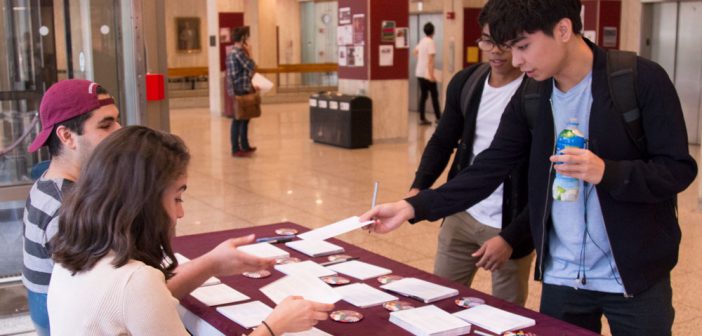
Fordham’s postcard campaign is part of a collaborative effort sponsored by the Office of Government Relations and Urban Affairs, Dorothy Day Center for Service and Justice, United Student Government – Lincoln Center, United Student Government – Rose Hill, Campus Ministry, and the Office of International Initiatives.
“It’s such an easy thing any member of our community can do,” said FCLC sophomore Rami Saleh, an Urban Plunge assistant at the Dorothy Day Center for Service and Justice, who was tabling at the Lincoln Center campus with Ubilla. “It makes it easier for us to unite as a community and show our voices.”
An excerpt from the postcard reads:
Since 1841, Fordham University has embodied the immigrant experience. It was built by immigrants, and it provided countless new Americans with the opportunity to earn an education. Fordham honors the nation’s immigrant heritage, and I hope you do as well.
The postcard campaign comes a month after Joseph M. McShane, S.J., Fordham University president, condemned the rescission of DACA, urging Fordham Rams to “do whatever you can to help our immigrant brothers and sisters in their time of need.” In an interview with America Magazine in September, he emphasized the importance of turning anger into action.
“It is one thing to be outraged in the moment,” he told the magazine. “We are all pretty perplexed and angry about this, but it is more important to move beyond the outrage to a place of action which has a hope of achieving the desired goal of getting this overturned by an act of Congress.”
]]>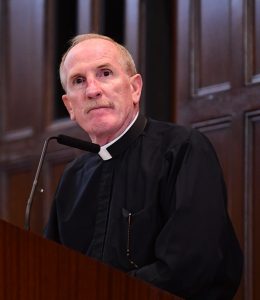
Dear Members of the Fordham Family,
As you are likely aware, I and every other president of a Jesuit university in the United States, have vigorously opposed ending the Deferred Action for Childhood Arrivals (DACA) program. I believe rescinding DACA is not only foolish, but unfathomably cruel. The decision throws the lives of 800,000 Dreamers into turmoil, damages our economy, and erodes our national security. For what? It is a naked appeal to the darkest side of human nature, and it is a stain on the promise of our country.
The U.S. Conference of Catholic Bishops has called the cancellation of the DACA program “reprehensible,” and goes on to say:
The Church has recognized and proclaimed the need to welcome young people: ‘Whoever welcomes one of these children in my name welcomes me; and whoever welcomes me does not welcome me but the one who sent me’ (Mark 9:37). Today, our nation has done the opposite of how Scripture calls us to respond.
The University has just updated its page, Resources for Undocumented Students (DACA), to reflect the administration’s decision to rescind DACA: www.fordham.edu/daca
Below is a message from Tom Dunne, vice president for administration, on some of the measures Fordham is taking to support Dreamers. I urge you to do whatever you can to help our immigrant brothers and sisters in their time of need.
Fordham has always been a home for immigrants, in a city of immigrants. We will remain true to our roots, and to the Jesuit, Catholic spirit that guides us.
Sincerely,
Joseph M. McShane, S.J.
#
Fordham University has been steadfast in support of the DACA Program in our advocacy efforts in Washington, D.C., and in Albany. We will continue to actively and aggressively engage federal policy makers in an effort to either reverse the order or secure a legislative remedy. We are urging the White House and our elected officials in Washington, D.C., to support legislative proposals such as The Dream Act (Durbin-Graham).
Our advocacy efforts include, but are not limited to the following: internet letter writing campaigns, post card campaign, radio advertisement and podcasts, newspaper editorials, use of phone banks for call-in campaigns, involving university stakeholders and Congressional visits. To learn more about our advocacy efforts, and to be part of the campaign, please contact Ms. Lesley Massiah-Arthur, associate vice president for government relations and urban affairs, at [email protected].
Tom Dunne, Vice President, Administration
]]>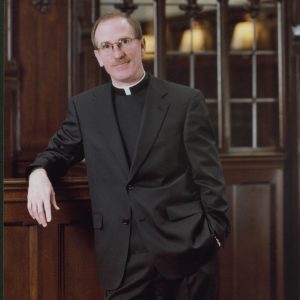
Dear Members of the Fordham Community,
This week I signed the Ignatian Network’s letter: Maintain Deferred Action for Childhood Arrivals (DACA), thus recommitting the University to the principles that have guided Fordham throughout its history. I urge you all to do likewise.
I know that Father McCarthy has already shared the letter with you: I follow up on his message to stress the importance that the University attaches to this issue. Fordham sees and embraces undocumented students as valued and loved members of our community. The University stands with these students, and we will do all we can to be effective advocates for them.
Fordham Seeks Clarification on Status of Undocumented Students
University Statement on the Status of Refugees and Immigrants
Father McShane Joins With University Presidents in Support of Undocumented Students
I do not have to remind you that we live in deeply unsettled times. The rise of hate speech and undisguised hostility toward immigrants and anyone considered other, the horrific drowning of Houston and parts of Louisiana with its attendant loss of life and human suffering (including some families in the University community), and political and cultural divisions that seem to grow deeper by the day, call us urgently to live out the lessons of the Gospel and our Jesuit principles.
We must do what is in our power to aid and protect the most vulnerable among us, at the University, and around the globe. Here, at Fordham, in one of the world’s capital cities, some of us live lives of relative ease and privilege. I call on you to join me in whatever way you can to help heal our society and our world.
You and your loved ones are in my prayers, today and always.
Sincerely,
Joseph M. McShane, S.J.
]]>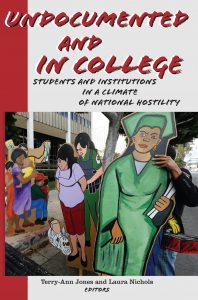 In the Catholic faith, Jesus is seen as one of the first immigrants, and is present in the faces of contemporary immigrants.
In the Catholic faith, Jesus is seen as one of the first immigrants, and is present in the faces of contemporary immigrants.
Undocumented and in College: Students and Institutions in a Climate of National Hostility, a new book published by Fordham University Press, documents the experiences of undocumented students as they navigate the processes of entering and then thriving in Jesuit colleges.
The book, which is based on an extensive two-year study conducted from 2010 to 2012, was edited by Terry-Ann Jones, Ph.D., associate professor of sociology and anthropology and Director of the International Studies Program at Fairfield University, and Laura Nichols, PH.D., associate professor of sociology at Santa Clara University.
Press editor Fred Nachbaur said the book—an unsolicited arrival in 2015—interested him because of its clear focus on a population that hadn’t received much attention. That has changed dramatically in the last two years, and in fact, he noted that a year ago they changed the sub-head of the book to reflect the changing political climate.
“This is probably more timely than we even anticipated when we signed them for the book,” he said.
Although many messages coming out of the Washington D.C. are hostile to immigration, Nachbaur said Undocumented and in College is an example of how Jesuit institutions resist these sentiments. The Association of Jesuit Colleges and Universities (AJCU) reaffirmed its support for DACA this week, and Joseph M. McShane, S.J., president of Fordham, issued his own statement on August 31 to similar effect.
Besides interviewing the students, Jones and Nichols surveyed the knowledge and attitudes among staff and faculty at Jesuit institutions about undocumented students in their midst, and the institutional response to their presence. Separate chapters explore the historical and present-day contexts of immigration, including the role of religious institutions.
One of the authors’ conclusions is that for undocumented students, the migration process is not necessarily the cause of the greatest stress. Rather, a major cause is the fear of the seemingly random differences by municipalities in the application of ad hoc deportation orders, the ambiguities in federal policy initiatives on which their futures rely, and a climate of ignorance on campus of immigration issues.
“The message is, ‘We need to do it.’ You can’t turn your back on undocumented students,” Nachbaur said.
]]>In a letter sent on May 23 to the Department of Homeland Security Secretary John Kelly, the presidents of the 65 colleges urged him to follow through with the administration’s promise to protect them from deportation.
“While the DACA policy remains in place, expanded immigration enforcement priorities have led to the detention of at least 10 DACA holders who have not committed a criminal offense that would compromise their DACA eligibility,” they wrote.
“In addition, recent actions and statements by Immigration and Customs Enforcement about young people who met the DACA criteria raise many questions about the safety of our students.”
The action follows a similar one in November, when Fordham, along with 99 other Catholic schools, pledged to support DACA students and other undocumented students.
]]>An estimated 11 million undocumented immigrants living in the United States wake up to this reality every day. To Eric Chun Lung Chen, Ph.D., they represent the voiceless whom he wants to give a voice to.
Chen, an associate professor of counseling psychology at the Graduate School of Education (GSE), has spent the past several years researching the quality of resilience, as manifested in the educational and career pursuits of undocumented immigrant students. He has focused most intently on “DREAMers,” roughly 700,000 undocumented individuals who were brought into the United States at a very young age. They were given a temporary relief from deportation in 2012 under former President Barack Obama’s Deferred Action for Childhood Arrivals (DACA) program. The act had been considered, but not passed, by Congress in 2010.
The DREAMers’ experience deeply resonates with Chen, who was born in Taiwan and came to the states as an international student to attend graduate school. In addition to the common adjustment challenges associated with being an immigrant, he found the bureaucracy and uncertainty he encountered in obtaining his employment-based immigration visas and green card to be stressful, taking almost a decade to complete.
“When one’s own identity seems to be stigmatized as a result of being a marginalized member of society, how does that stigmatized identity impact one’s mental health? I’m particularly interested in the sense of self, and how it changes over time as it relates to one’s resilience and interpersonal relationships,” he said.
“If I were one of them, I might have given up hope a long time ago.”
DACA and the Sense of Self
Two years ago, Chen and GSE students conducted a research study, where they spent more than a year recruiting and interviewing a dozen undocumented Latinos who benefited from DACA. Their study focused on DREAMers’ experiences of self, their interpersonal relationships, and their future pursuits in the wake of DACA.
What Chen found was that although the DREAMers were relieved that they didn’t have to worry about being deported for the time being, that relief was tempered by an increased sense of responsibility for their parents as well as their siblings who remained undocumented.
“So it’s a mixed blessing. On one hand, they perceive their future to be brighter for them to pursue more educational and work opportunities. On the other hand, they now experience pressure from their undocumented family members to seek better-paying jobs,” Chen said.
Stay up-to-date on campus happenings.
Sign up for our e-weekly Fordham News.
More recently, he and his students completed a study on the educational decision-making processes of 10 female Spanish-speaking DREAMers on what factors motivated them to pursue a college education. The study specifically examined gender-based barriers and expectations. One significant finding was that those Latina students who did not seek help from school personnel in their college admissions process did so out of fear of disclosing their undocumented status. Individuals who did disclose their status were not provided with adequate resources or support because of the school staff’s lack of awareness and knowledge of how to assist DREAMers. This was less the case at small, more individualized high schools.
Parents seemed to be the greatest source of support and motivation for DREAMers’ college pursuits, especially when they experienced feelings of hopelessness. With regard to gender roles, some participants felt conflicted in their need to take on household responsibilities and to pursue a higher education.
A Need That Is Greater Than Ever
Such studies are difficult to conduct, in part because of the time and effort it takes to recruit undocumented immigrants and earn their trust, said Chen. But the recent presidential election has made the work more important than ever, and Chen sees a greater need to translate an abstract concept like immigration into a narrative about flesh-and-blood individuals with dignity.
As someone who teaches future school counselors, mental health counselors, and psychologists, Chen said there’s a practical purpose as well—to encourage a dialogue that builds a connection through diversity.
“I want my students to be prepared when they work with DREAMers after they graduate, to have an empathic understanding of their struggles, to offer support, and to advocate for them rather than say, ‘Your family broke the law, and you should go back to your country.’ I don’t think that’s consistent with Fordham’s mission of social justice and respect [for]human dignity,” he said.
“Regardless of our personal views, I hope my research helps bridge the political divide by sharing DREAMers’ voices, fears, and their audacious hopes for the uncertain future. Hopefully and realistically, they’re going to continue to live among us, so let’s find a way to support them so they can fulfill their dreams and become productive members of our society.”
]]>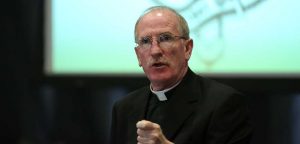 Dear Members of the Fordham Family,
Dear Members of the Fordham Family,
Joseph M. McShane, S.J.
]]>At this moment when our undocumented students are most vulnerable and afraid, I am writing to you to inform you that I have signed three documents that I hope make it clear that Fordham sees and embraces undocumented students as valued and loved members of our community, that Fordham stands with them, and that we will do all we can to be effective advocates for them. Since my signature signals not only my endorsement, but the endorsement of the entire University community of the sentiments contained in them, I assure you that I did not sign them lightly. Rather, I did so only after a great deal of research and prayer.
Because he was himself an immigrant and the victim of prejudice and discrimination both in Ireland and in the United States, and because he was the bishop of a largely immigrant community that suffered from the same discrimination from which he had suffered, Archbishop Hughes was passionately devoted to America’s immigrants. Therefore, when he founded Saint John’s College (Fordham University) in 1841, he did so to create a school that would make it possible for the immigrants whom he served to receive an education that would both confound their enemies and enable them to take their rightful place in American society.
For its entire 175-year history, Fordham has kept faith with its founder’s vision and committed itself in a special way to serving immigrants and their sons, daughters, grandsons and granddaughters. To be sure, the ethnic identities of the students whom Fordham has served have changed in the course of time. Through the decades, however, the University has never deviated from its historic mission of welcoming and serving new Americans, a mission that has shaped and defined us, and a mission that has enriched us beyond measure. I would be less than honest if I didn’t tell you that as the grandson of four Irish immigrants and the son of a first-generation college graduate whose life was transformed by the education that he received here at Fordham, the University’s devotion to and service of generations of new Americans is especially close to my heart.
Of course, Archbishop Hughes’s legacy is not the only reason that the University has always been drawn to the service of new Americans. Far from it. Our Catholic roots remind us of the Gospel mandate to serve those at the peripheries, and to treat them as cherished sisters and brothers. Our Jesuit identity places upon us the sacred responsibility to treat every student in our care with cura personalis, that is to say, we are called and challenged to treat every Fordham student with reverence, respect and affirming love.
In light of the powerful forces that have shaped us, we can never turn away from those members of our community who are most vulnerable. To do so would be a betrayal of both the ideals that we hold most dear and the sacred mission to which we have devoted ourselves for the past 175 years. We simply cannot do that. We will not do that.
Below is the complete text of the statement written by the presidents of the member schools of the Association of Jesuit Colleges and Universities (AJCU), and links to the 2013 AJCU statement, the Pomona Statement, and the statement of the member schools of the Association of Catholic Colleges and Universities.
As I close, let me ask you to pray for all of our students, and especially our undocumented students. I assure you that you all remain in my prayers.
Joseph M. McShane, S.J.
President
Statement of AJCU Presidents – November 2016
As Presidents of the Association of Jesuit Colleges and Universities we feel spiritually and morally compelled to raise a collective voice confirming our values and commitments as Americans and educators. We represent colleges and universities from across our nation with more than 215,000 students and more than 21,000 faculty, and more than 2 million living alumni.
Grounded in our Catholic and Jesuit mission, we are guided by our commitment to uphold the dignity of every person, to work for the common good of our nation, and to promote a living faith that works for justice. We see our work of teaching, scholarship and the formation of young minds and spirits as a sacred trust.
That trust prompts us to labor for solidarity among all people, and especially with and for the poor and marginalized of our society. That trust calls us to embrace the entire human family, regardless of their immigration status—or religious allegiance. And experience has shown us that our communities are immeasurably enriched by the presence, intelligence, and committed contributions of undocumented students, as well as of faculty and staff of every color and from every faith tradition.
Therefore, we will continue working:
- To protect to the fullest extent of the law undocumented students on our campuses;
- To promote retention of the Deferred Action for Childhood Arrivals Program (DACA);
- To support and stand with our students, faculty and staff regardless of their faith traditions;
- To preserve the religious freedoms on which our nation was founded.
As we conclude this Year of Mercy, we make our own the aims enunciated by Pope Francis: “Every human being is a child of God! He or she bears the image of Christ! We ourselves need to see, and then to enable others to see, that migrants and refugees do not only represent a problem to be solved, but are brothers and sisters to be welcomed, respected and loved.”
We hope that this statement will inspire members of our University communities, as well as the larger national community, to promote efforts at welcome, dialogue, and reconciliation among all that share our land. We welcome further conversation and commit ourselves to modeling the kind of discourse and debate that are at the heart of our nation’s ideals. And we promise to bring the best resources of our institutions – of intellect, reflection, and service–to bear in the task of fostering understanding in the United States at this particular time in our history.
AJCU 2013 Statement